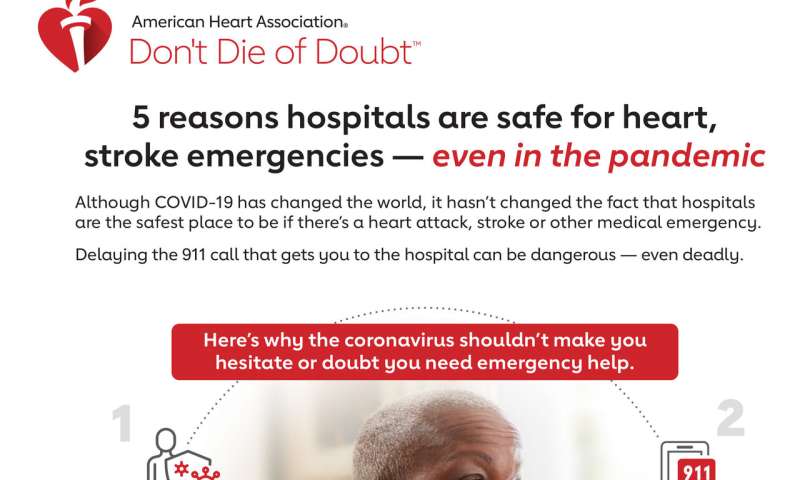Fueled by COVID-19 fears, Hispanics and Black Americans fear going to the hospital for heart attack or stroke

As COVID-19 cases continue to rise in 44 states and fear of calling 9-1-1 or going to the hospital persists, new data from a survey conducted online by The Harris Poll on behalf of the American Heart Association, the world’s leading nonprofit organization focused on heart and brain health for all, found that Hispanics and Black Americans are most likely to stay home if experiencing medical emergencies, like a heart or a stroke, to avoid the risk of contracting COVID-19 at the hospital.
New data from the survey found more than half of Hispanics (55%) would be scared to go to the hospital if they thought they were having a heart attack or stroke because they might get infected with COVID-19, and 41% would stay home if they thought they were experiencing a heart attack or stroke rather than risk getting infected at the hospital.
That survey also found that nearly half of Black Americans (45%) say they would be scared to go to the hospital if they thought they were having a heart attack or stroke because they might get infected with COVID-19, and a third (33%) would stay home if they thought they were experiencing a heart attack or stroke rather than risk getting infected at the hospital.
Comparatively, less than half of whites (40%) would be scared to go to the hospital if they thought they were having a heart attack or stroke because they might get infected with COVID-19, and less than a quarter (24%) would rather stay home than risk getting infected at the hospital.
Heart attacks and stroke haven’t stopped during to the pandemic. To help alleviate fears, the American Heart Association created a public education and awareness campaign in English and in Spanish called Don’t Die of Doubt that reminds Americans, especially in Hispanic and Black communities, that the hospital remains the safest place to be if experiencing symptoms of a heart attack or a stroke.
“This finding is yet another challenge for Black and Hispanic communities, who are more likely to have underlying health conditions such as cardiovascular disease and diabetes and dying of COVID-19 at disproportionately high rates,” said Rafael Ortiz, MD, American Heart Association volunteer medical expert and Chief of Neuro-Endovascular Surgery at Lenox Hill Hospital, Northwell Health. “I am proud of the work the American Heart Association is doing to address this critical issue with the Don’t Die of Doubt campaign. Health care professionals know what to do even when things seem chaotic, and emergency departments have made plans behind the scenes to keep patients and healthcare workers safe even during a pandemic.”
These historically excluded communities are dying of COVID-19 at disproportionately high rates, as they’re more likely to have underlying health conditions, like cardiovascular disease and diabetes.
Cardiovascular disease is still the leading cause of death in the United States, and heart attack and stroke symptoms are always urgent. The hospital is still the safest place to be, so don’t hesitate to call 9-1-1 and don’t stay home –- don’t die of doubt.
Symptoms of a heart attack can include:
- Chest discomfort. Most heart attacks involve discomfort in the center of the chest that lasts more than a few minutes—it may go away and then return. It can feel like uncomfortable pressure, squeezing, fullness or pain.
- Discomfort in other areas of the upper body. Symptoms can include pain or discomfort in one or both arms, the back, neck, jaw or stomach.
- Shortness of breath. This can occur with or without chest discomfort.
- Other possible signs include breaking out in a cold sweat, nausea or lightheadedness.
- Women’s most common heart attack symptom is chest pain. Some women are more likely to experience shortness of breath, nausea/vomiting and back or jaw pain.
Use the letters in “F.A.S.T.” to recognize signs of a stroke:
- Face Drooping. Does one side of the face droop or is it numb? Ask the person to smile.
- Arm weakness. Is one arm weak or numb? Ask the person to raise both arms. Does one arm drift downward?
- Speech difficulty. Is speech slurred, are they unable to speak, or are they hard to understand? Ask the person to repeat a simple sentence, like “the sky is blue.” Is the sentence repeated correctly?
- Time to call 9-1-1. If the person shows any of these symptoms, even if the symptoms go away, call 9-1-1 and get them to the hospital immediately.
Source: Read Full Article
